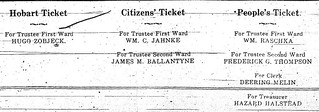
(Click on image to enlarge)
Concerning his candidacy, the News remarked: "Mr. Raschka has been a resident of this vicinity for a number of years, being an extensive dealer in hay and grain, and has been a resident of Hobart for the past couple of years. He has been very successful in his business, and he no doubt would conduct the town's business in the same progressive and conservative way if elected to the position."
I don't know how Carrie Raschka felt about this. I notice she got out of town for a week in the latter part of October, going with Charles and Constance Chester as they took yet another road trip (this time a comparatively short one through eastern Indiana and southern Michigan).
Anyway, Carrie did not have long to worry about her husband's involvement in politics. On November 6 the voters of Hobart elected Hugo Zobjeck as first ward trustee by a considerable margin.
In the second ward, the incumbent James Ballantyne lost to Frederick Thompson (son of Alexander Thompson and a former Ainsworthite). The town Treasurer and Clerk — Hazard Halstead and Deering Melin, respectively — had run unopposed and thus could hardly avoid being re-elected.
Hobart women could not vote in this election. No Hoosier woman could vote in any election. The Indiana supreme court had so ruled, and its decision was final.
The challenge had begun with a lawsuit filed by an Indianapolis businessman, William W. Knight, against the Indianapolis board of election commissioners.* As we know, the Marion County superior court had ruled in Mr. Knight's favor in September 1917. The supreme court heard the appeal during the second week of October. The decision came down two weeks later: it upheld the lower court's ruling.
The Indiana constitution gave the right to vote only to male citizens over the age of 21, said the court; hence the Indiana legislature had exceeded its authority in extending even limited suffrage to women.
The decision was a serious setback. It meant that Hoosier women could win the right to vote only by getting the current constitution amended or a new one adopted. Either process would take at least six years. So the women of Indiana had a long fight ahead of them, unless, of course, they got help from the federal level.
_____________________
*I've not been able to find out any more about Mr. Knight or what his motivations were, aside from one report that among the plaintiff's arguments was the contention that allowing women to vote would cause "great additional expense and much confusion."
Sources:
♦ "Election Day Is One Month Away, Tuesday, Nov. 6th." Hobart News 4 Oct. 1917.
♦ "Election Next Tuesday." Hobart Gazette 2 Nov. 1917.
♦ "Hugo Zobjeck and Frederick Thompson Elected Trustees." Hobart News 8 Nov. 1917.
♦ "Indiana Women's Right to Vote Now Up to Supreme Court." Hobart News 18 Oct. 1917.
♦ "Local and Personal." Hobart News 4 Oct. 1917.
♦ "Local Drifts." Hobart Gazette 26 Oct. 1917.
♦ "Makeup of Tickets For the Coming Town Election." Hobart News 25 Oct. 1917.
♦ "New Trustees Elected." Hobart Gazette 9 Nov. 1917.
♦ "Republicans Victorious." Hobart Gazette 7 Nov. 1902.
♦ "Supreme Court Holds Woman's Suffrage Law Unconstitutional." Hobart News 1 Nov. 1917.
♦ "Women Cannot Vote." Hobart Gazette 2 Nov. 1917.
♦ Year Book of the State of Indiana for the Year 1917. Indianapolis: Wm. B. Burford, 1918.

No comments:
Post a Comment